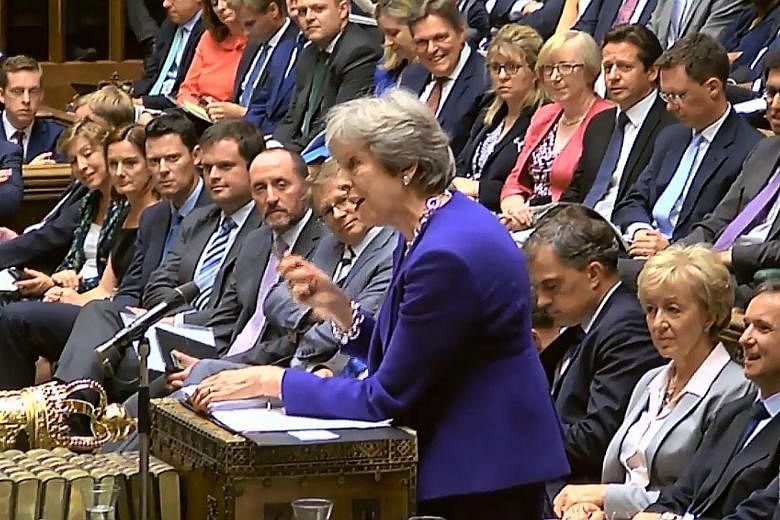LONDON • British Prime Minister Theresa May yesterday said her government had begun negotiations with the European Union based on her hard-won Brexit plan, pressing on with a proposal roundly criticised by both wings of her Conservative Party.
After narrowly escaping defeat in Parliament earlier this week over her proposal for leaving the EU, Mrs May signalled she would not drop her proposal for Britain's future relationship with the bloc .
But by sticking to her plan for a "business-friendly" departure from the EU, Mrs May had thrown down the gauntlet to Brexit supporters and pro-EU lawmakers in her party who are at war with each other, and - for some - with the Prime Minister herself.
In a rowdy session of Parliament, Mrs May was challenged by a Tory pro-Brexit lawmaker to explain when she had decided to change her catchphrase from "Brexit means Brexit", to "Brexit means Remain".
"Brexit continues to mean Brexit," Mrs May said to cheers from her Conservative supporters.
Mrs May also said talks had started with Brussels based on the proposal set down in a white paper policy document last week after her divided government thrashed out a deal at her Chequers country residence. "The Chequers agreement, the white paper are the basis for our negotiation with the European Union and we have already started those negotiations," she said.
Even as Mrs May's party remained in disarray over the plan, EU member Ireland yesterday said it was focusing on the white paper, unwilling to be diverted over the changes to her Brexit plans forced through in Parliament this week.
Mrs May's vulnerability in Parliament, where she lost her majority in an ill-judged election last year, was laid bare this week when she faced rebellions from both the pro-Brexit and pro-EU wings of her party. She won the votes on a customs and a trade Bill, but suffered an unexpected defeat on a separate amendment, which means her government must now seek continued participation in the European medicines regulatory framework.
The government's approach to securing victory in Parliament has not only deepened divisions in her party, but also raised the issue of trust. One Conservative lawmaker told Reuters the party whips, whose job it is to enforce discipline in Parliament, had threatened to call a confidence vote in May if she lost - a move that could bring down the government and lead to elections. Rebel lawmaker Anna Soubry told BBC Radio that the prospect of a national election was also raised. "It was an appalling spectacle," Ms Soubry told BBC Radio 4, adding she had told a senior whip to "bring it on".
REUTERS

